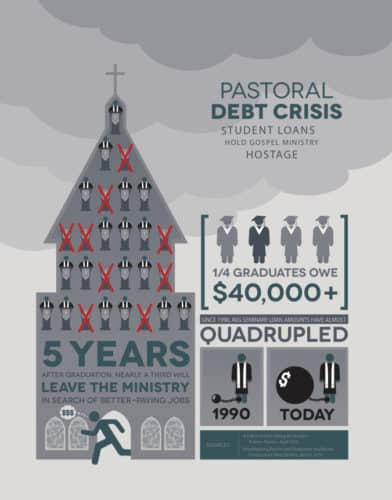The short of it: for most college students I would say— No, you should not go to seminary (right out of college).
“Get some experience in ministry for a few years and then, if you feel it would be helpful, go to seminary. If you go straight into seminary you simply will not have context for all the information you are taking in. You will not have pegs to hang things on. And I think Cru offers the best 2 years of training in ministry.”
“Ralph Winter’s observation is tragically too true: The most extensive, pervasive strategic error in the Christian tradition lies squarely in our coveted and generously supported, but unquestioned, concept of years of “schooling” as the way for leaders to develop and be trained. . . .Formal education definitely has a place and can make an enormous contribution in the life of a leader. I am the product of a couple of graduate degrees and am deeply grateful for my formal education. But there are limitations to what formal education can do.” – Sam Metcalf in his book, Beyond the Local Church
“Of the seminary students who graduated in 2011 with a Master of Divinity degree (the typical degree for a full-time pastor), more than 25 percent accrued more than $40,000 in educational debt, and five percent accumulated more than $80,000 in debt. Those lucky enough to get a full-time job as a pastor will join a profession whose median wage is $43,800”
Don’t go to seminary:
- to grow spiritually
- to figure out what you want to do when you grow up
- because you want to go into ministry (if a student says this, ask them: “How will seminary help you do ministry better?” If they can’t answer that, they’re not ready to go to seminary)
who should go to seminary:
For those wondering whether to go to seminary: It is critical to discern why you want to go in the first place. No one should go to try and find themselves, get fixed, get healed, get spiritual or figure out what they want do when they grow up. Save your money and go to a good Christian counselor.Who should go?
- If you are going to be a teaching pastor, getting the best of biblical studies, languages, theology and church history is essential. There can be little doubt that most seminaries have this training down to an art, and no matter what anyone says, such training would be hard to duplicate on most local church levels.
- If you feel called to work within a denomination or ecclesiastical structure that requires it. [My thought: It’s still not a bad idea to ask “Well, is that the best agency for you?”]
- If you feel called to academia.
Here are some excellent places to read more:
- Brian Strider has a very helpful post on Cru.org re what to consider in choosing a seminary.
- Gary Runn with a A Perspective On Seminary:
I did not begin my seminary education until I was in my 30’s. As a matter of fact, I never recommend that anyone pursue seminary education until they have been out of undergraduate school for at least two years. Even a few more years under your belt will not hurt anything. You can always discern who the youngest and least experienced students in the room are by the quality of the questions they ask. Those who arrive a little older know why they are there and what they want to get out of a seminary education.
- Why You Shouldn’t Go to Seminary by Bob Thune
“First things first: theological training is a must for anyone called to the pastorate. So I’m not denying the importance of sound, rigorous theological training. I’m simply questioning whether seminary is the place to get it. Here are some of my concerns . . .”“Christians have a nebulous perception that a seminary degree is like a union card for pastoral ministry. News flash: it’s not. In fact, in Acts 29, we find that church planters without a seminary degree are often more successful than those with a degree.”“Seminary pulls pastors “off the streets” for 3 or 4 years to isolate them in a sterile academic environment. While this might be great for paper-writing, it’s really bad for missional living.”“The seminary model is a tired one that needs to be updated for a post-Christian, technological age. Here’s a possible way forward . . .”
- James Emery White (a pastor AND former seminary president) on the Church and Culture blog.
- So You Are Thinking of Going to Seminary? by Kevin DeYoung
Three Questions Before You Go1. Might you benefit from more experience in the “real world” first? Many students will graduate from college and head off to seminary. But for many students, seminary will be richer and more helpful with a little more life experience.2. Will your seminary education be going toward some end which requires such a seminary degree? Graduate school costs money, money you probably don’t have. With so many Christian books, conferences, and online resources these days, you can learn a whole lot on your own. If you are going to seminary because you love Jesus and love the Bible, that’s wonderful, but you may want to consider if there are less costly, less time-consuming, less disruptive ways to keep learning and growing.3. Are you prepared for a largely academic approach to learning? I am all for academics. But writing long papers, taking tests, listening to lectures, and reading thousands of pages is not for everyone. Seminary is not like a three year Passion Conference. It is like graduate school. Know what you’re getting in to.
- Todd Wagner, Senior Pastor at Watermark Church in Dallas, has an excellent series of very honest posts on seminary. A few of his points:
You don’t want to work at a church that will hire you only if you have been to [seminary]. [If a] church would not consider someone because they do not have a degree from a seminary, DESPITE an obvious qualification of life and commitment to continual learning, it is likely a church that believes that the unbiblical idea of “clergy/laity distinction” is real and necessary. I agree with Paul that our lives are the best letters of accommodation (2 Corinthians 3:1-6a) and with Peter that we are a kingdom of priests (1 Peter 2:9) who should be led not by degreed men, but by men who separate themselves by degree of personal holiness and giftedness.
I do not hire folks because they have been to or are going to any seminary. The easiest thing to teach someone is theology and Bible. I hire guys that have shown a history of faithfulness, teachability and passion for the King and his Kingdom. DTS can teach theology and Bible (and they do well), but not the other stuff.
Seminary neither kills nor helps your heart. Many guys have struggled greatly in their walk with Christ while at [seminary] my guess is they would have struggled greatly had they not been down there. Many guys have grown in their love for and usefulness to Christ while at [seminary] my guess is that they would have continued in obedience and faithfulness wherever they were. If you go to [seminary] thinking it is going to be the means through which you take ground in your walk for Christ…you will be disappointed and discouraged.
- In his book Dangerous Calling, Paul Tripp has an excellent chapter on the spiritual dangers of seminary:
Academized Christianity, which is not constantly connected to the heart and puts its hope in knowledge and skill, can actually make students dangerous. It arms them with powerful knowledge and skills that can make the students think that they are more mature and godly than they actually are.Is it not possible for seminary students to become experts in a gospel that they are not being exposed and changed by? Is it not dangerous to teach students to be comfortable with the radical content of Scripture while holding it separate from their hearts and lives? Is it not dangerous for students to become comfortable with the message of the Bible while not being broken, grieved, and convicted by it? Is it not important for seminary students to be faced daily with the personal implications of the message that they’re learning to unpack and deliver to others? Is it not vital to hold before students who are investigating the theology of Christ the frequent and consistent call to life-shaping love for Christ? Shouldn’t every Christian institution of higher learning be a warm, nurturing, Christ-centered, gospel-driven community of faith? Could it be that rather than having as our mission students who have mastered the Book, our goal should be graduating students who have been mastered by the God of the Book?I am convinced that the crisis of pastoral culture often begins in the seminary class. It begins with a distant, impersonal, information-based handling of the Word of God. It begins with pastors who, in their seminary years, became quite comfortable with holding God’s Word distant from their own hearts.[Now, obviously this is true for any Christian leader, whether in seminary or not, and Tripp spends the majority of his book addressing the dangerous world of all Christian leaders]
What are your thoughts on college students going to seminary right out of college?
For those of you who have gone to seminary, what helpful insights do you have?
photo courtesy of kern.justin

